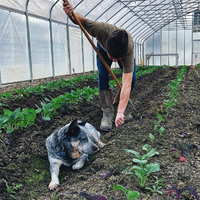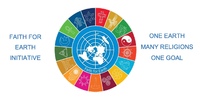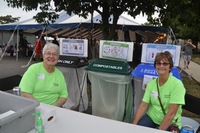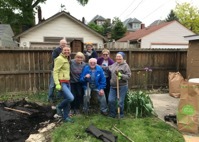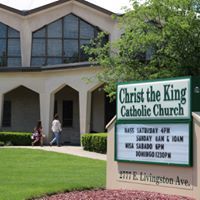Search
237 items
-
Engaged Organizations: Young Evangelicals for Climate Action
Young Evangelicals for Climate Action is a group of young evangelicals that work on overcoming the climate crisis. Their main goals are to build a movement to act and advocate together, to influence senior evangelical leaders to support climate action, and to hold political leaders accountable. -
The Green Seminary Initiative Partner Schools
For an individual interested in ecological justice and ministry, it may be important to attend a seminary or divinity school that is committed to care of creation. Partnering schools are listed below:
Austin Presbyterian Theological Seminary
Boston University School of Theology
Christian Theological Seminary
Claremont School of Theology
Columbia Theological Seminary
Drew Theological School
Garrett-Evangelical Theological Seminary
Methodist Theological School in Ohio
Pacific Lutheran Theological Seminary
The Samuel DeWitt Proctor School of Theology
Trinity Lutheran Seminary
Universidad Biblica Latinamericana
Union Presbyterian Seminary, Charlotte -
Media Planet: Impacting Our Future
This organization publishes content that addresses many current global and local. This includes a number of articles on issues like hunger, deforestation, and more. It can be difficult to know where to start when one decides to make more earth conscious decisions, but this website offers perspectives on global issues and more personal approaches to creation care, like in their article “Why It’s Smart to Invest in Sustainable Water Heaters and HVAC Systems.” The articles available in this resource are very helpful to introduce issues currently plaguing our planet. -
The Baltimore Food and Faith Project
Started as an initiative of the Johns Hopkins Center for a Livable Future. This organization connected with faith communities in attempts to improve food security and the food systems in the Maryland area. By connecting food to the ethics of faith, they offer many opportunities to reflect on one’s own earth stewardship. -
FaCT Ohio
A group of anti-fracking activists were meeting in northeast Ohio. Faith leaders at that meeting thought it would be beneficial to approach the issue of fracking from the perspective of faith. They have grown to now include members from 45 faith communities primarily in Ohio but West Virginia is also represented. They welcome anyone to join their organization regardless of background or faith. They work to provide education and advocacy materials on energy conservation and renewable energy for faith communities in Ohio. They also hold regular statewide meetings. Their website includes a blog that is regularly updated. -
The Christian Church (Disciples of Christ) Resource Page
The Christian Church sees their mission to move toward wholeness for the whole world as directly connected to their commitment to creation care. Their resource page offers links to connect with Green Chalice, a partnering ministry that is the official creation care ministry for The Christian Church. Links to further reading, resources for mindful eating, and the Alverna Covenant (a creation care covenant) can also be found on the page. -
Ohio Fair Trade Network
The Ohio Fair Trade Network works to support fair trade products in Ohio retailers. They began working with the InterReligious Task Force on Central America to bring more fair trade resources to Ohio. They also partnered with Hiram College and John Carroll University to offer internships. They have continued to partner with faith groups as they work to establish a fair trade network in Ohio. -
The InterReligious Task Force on Central America
The InterReligious Task Force on Central America (IRTF) was founded in Cleveland in the 1980s after four US women were killed in El Salvador. They gather across religious denominations and traditions to work for peace and justice in Central America. They expose the negative realities of globalization including the ecological destruction that has occurred in Central America. They advocate for human rights and in sponsoring fair trade they also support environmental stewardship.
In May 2019, they held two Food Action Forums, one on alternative food systems and another on alternative trade organizations. -
InterReligious Task Force on Central America Environmental Human Rights
The Cleveland based organization The InterReligious Task Force on Central America holds Environmental Human Rights as one of their primary issues. Throughout Central America, large companies are forcing native communities out of their land to exploit it for natural resources. This group works to fight against this attack which often results in negative consequences for the land and the people. -
Seminary Hill Farm
The Seminary Hill Farm is a ministry on the campus of the Methodist Theological School in Ohio (MTSO). Made of fields, hoop houses, and a greenhouse, the farm works to provide fresh food throughout the year to the Seminary Hill Kitchen, a three-season community supported agriculture (CSA), and local farmers markets. The work of the seminary hill farm supports sustainable practices and MTSO’s commitment to faithful earth stewardship. You can also follow their blog that features articles on eating fresh local produce and life at the farm. -
Toledo GROWs
Toledo GROWs supports more than 125 community gardens by providing education, materials, volunteers, and tools to local community gardens, including faith-based community gardens. They also operate a CSA (Community Supported Agriculture) available to local Toledo residents. In addition to the support they give to community gardens, they also offer workshops and programming to the larger Northwest Ohio community. -
Madison Christian Community
Madison Christian Community is the community created by Community of Hope, UCC and Advent Lutheran Church, ELCA. They have made environmental care and action a major cornerstone of their mission. Their church website is a wonderful resource for many congregations who are looking for success stories for implementing creation care into one’s own community. -
United Nations Environment Programme Faith for Earth Initiative
Launched in November of 2017, the UN Environment Faith for Earth Initiative recognizes the social, economic, moral, and environmental influence of faith communities, and established the initiative to "strategically engage with faith-based organizations and partner with them to collectively achieve the Sustainable Development Goals (SDGs)." As stated on the initiative's webpage: "Faith for Earth has three main goals: to inspire and empower faith organizations and their leaders to advocate for protecting the environment, to green faith-based organizations’ investments and assets to support the implementation of SDGs, and to provide them with knowledge and networks to enable their leaders to effectively communicate with decision-makers and the public." -
Interfaith Rainforest Initiative
From the organization's website: "The Interfaith Rainforest Initiative is an international, multi-faith alliance that aims to bring moral urgency and faith-based leadership to global efforts to end tropical deforestation. It is a platform for religious leaders to work hand-in-hand with indigenous peoples, governments, civil society and business on actions that protect rainforests and safeguard those that serve as their guardians." The initiative focuses on raising awareness, mobilizing action, and influencing policy. -
Congregational Profile: Our Lady of Perpetual Help, Grove City, OH: How it began in one parish
In 2016, prompted by Pope Francis’ encyclical “Laudato Si,” we at Our Lady of Perpetual Help Parish in Grove City, Ohio, held two 8-week sessions of discussions on the encyclical and at the end of the second session, our pastor, Fr. Daniel J. Millisor, appointed the discussion leader, Sister Nancy Miller, OSF as chairperson and called together a team to explore how the parish might lower our carbon footprint. The Creation Care Council (CCC) of our parish meets monthly for prayer, discussion and action in response to Laudato Si’s call for greater care for our common home.
We conducted a parish survey, with the intention of enhancing awareness among parishioners, as well as to determine if, and how, members were already incorporating recycling and composting into their daily lives. The results were highly, though not entirely, favorable. In addition to regularly inserting information and suggestions into our parish bulletins, taking the CCC members to tour a landfill, recycling plant, and the OSU Byrd Polar Research Center, we requested that all committees at the parish look at ways to reduce or eliminate their use of Styrofoam dinnerware. Rather than condemn polluters, we wrote thank you notes to businesses that showed environmental stewardship. We began annually purchasing and giving away seedling trees to plant on Earth Day. We took on trying to improve parish recycling efforts – providing new recycling containers for all parish offices, inviting a local official – an environmental expert – to explain to us what is and is not recyclable, preparing an interactive recycling quiz at the parish festival, and then attempting to bring recycling to the parish picnic and festival.
The efforts to incorporate recycling in parish events “failed” the first year, but we got it right the second year and this (the third) year, we successfully introduced food waste composting to Lenten Parish Fish Fry dinners, the Parish Picnic, and our largest parish event of the year: the Parish Festival. The 2019 Parish Festival served an estimated 5,000 meals, working with food vendors to increase their ability to serve compostable dishware and cutlery. In total, the CCC was able to divert 2,704 gallons of waste from the local landfill, which constituted 86% of all waste at the Festival.
We also exceeded all expectations in soliciting nearly 100 volunteers to help teach and monitor correct depositing of these materials - without tapping the usual volunteer corps that was still needed to keep the regular parts of the festival going. With the support of our pastor and dedicated CCC members, we’ve come a long way, and still feel like we have only just begun!
-
Congregational Profile: St Francis of Assisi parish Creation Care Team, Columbus, OH
When St. Francis of Assisi’s Creation Care Team volunteered to take responsibility for caring for the church’s flower and vegetable gardens in the summer of 2018 it faced a challenge: how to dispose of yard waste in a responsible manner. The parish did not have resources to hire a vendor to appropriately dispose of leaves and garden debris and hauling it away in our private cars while possible would take extra time. The Team members did know though that we did not want to continue to toss the yard waste in the trash, which is what had previously been done.
Luckily a solution was at hand: a new member of our parish and our Creation Care Team—Todd Marti-- serves as one of the “garden stewards” at Upper Arlington Lutheran Church’s community garden at Mill Run. Todd volunteered to haul away the yard waste from St. Francis and add it to the compost bins at the community garden. So St. Francis’ yard waste helps grow food that when harvested feeds hungry families through Neighbors (SON) Ministries’ Hilliard Free Lunch Summer Camp for Kids program, the Hilltop, Mid-Ohio Food Bank, and through Faith Mission-- a win for all involved.
-
Bishop Hartley High School, Columbus, OH
Bishop Hartley has assembled a Care 4 Creation faculty committee, which focuses on long-term plans at the school. There is also a Care 4 Creation Association, which is for students and is also student-led. Instructors Rick Kohut and Ann Hawk have spearheaded some of the more long-term creation care projects there. Each have set up a vermicomposting bin in their classrooms, offering that it works well and is relatively low maintenance. Students from one of Rick’s classes had worked on a project where they created a poster/chart with pictures of endangered animals. Some of the students from Rick's classes engaged in the school's climate strike. One highly motivated student, Jamal, wrote a letter about the event which he sent to local politicians. Ann has been attending a yearly AEP Ohio energy efficiency program, and they in turn provide her with free energy savings kits for each of her students. AEP also offers energy saving kits for residential customers who are willing to complete their online Home Energy Profile. In addition, two new drinking fountains are about to be installed at the school that are designed to fill reusable water bottles. The school is also in the process of creating water bottles for sale with their school’s logo on them. The intent is to cut down on students and faculty purchasing and bringing in individual plastic bottles of water.
-
Engaged Organizations: St. Vincent de Paul School, Mt. Vernon, OH
Creation care work at St Vincent de Paul School, Mt. Vernon, began in 2006 when the school received funding from the Knights of Columbus to purchase a dishwasher for their kitchen. Following this, the school began participating in the Hope Now program – an organization that provides used old donated doors to build tables. The school provides transportation to their annual K-6 field trip to The Brown Family Environmental Center at Kenyon College and their annual 5th grade summer camp through Lutheran Outdoor Ministries in Ohio (students take turns weighing food waste). Additional sustainability projects include collaboration with the parish and the local community. The school participated in an all-parish project through the Green Tree Plastics company’s A Bench for Caps sustainability program (students collected and sorted bottle caps in exchange for three benches). The school plans to create a grotto area using their three recycled benches. In order to foster green living and healthy community-school relations, the school provided planter flowers to local businesses.
Administrators at St. Vincent de Paul acknowledge the importance of maintaining social justice programs in accordance with Laudato Si's urgent message to care for the poor. Students from Beth’s Robinson's 6th grade social studies classes participate in a demographics project. Each year students select one continent, usually Africa, to learn more about the conditions of poverty. The class then raises money through various fundraisers and donate to parts of the continent through Catholic Relief Services. An upcoming project includes having students sew plastic bags together to create tarps to be donated to homeless shelters in the area.
-
Engaged Organizations: Recyclean, Inc. Kenosha, WI
Recyclean, Inc., is a deconstruction company located in Kenosha, Wisconsin, with a new branch to be opened in Columbus, OH in the near future. About 15 years ago, the owner recognized that there was too much waste entering landfills, as construction landfill waste is predicted to double by the year 2025. The company focuses on the reuse and recycling of materials and structures from the deconstruction work of their residential projects, which comprises 70 percent of their business, as a way to decrease the amount of materials that enter the landfills. Prior to renovations and tear downs, the company provides a quote for the materials and a 3rd party independent appraiser assigns value to the estimated donation value. Some of the materials are donated to community charities – i.e. Restores of Habitat for Humanity or Columbus Architectural Salvage. Homeowner are able to choose a charity based on the options provided by the company. Other materials, such as brick and wood, are recycled (purchased for use elsewhere). Recyclean, Inc. aims for 70 percent of the materials to be recycled and reused. The company also provides facilitation for the transfer, including delivery of materials and building structures, to their respective designated entities.
-
Engaged Organizations: The Catholic Foundation of Ohio - Columbus
The Catholic Foundation of Columbus, Ohio is designed to be responsive to interests that come from within the diocesan parishes and schools. To the extent that those interests have included creation care work, there has been grant activity. Dan Kurth, Director of Grants for the Catholic Foundation, offers that the foundation’s rubric for creation care initiatives is essentially: Does this project have any green energy sustainability pieces to it? The energy efficiency component of the foundation’s responsive grants is the main integration of a Laudato Si' principle into the foundation's grant work. As the Laudato Si encyclical has grown in awareness, more funding has become available as energy efficiency-related projects have become more commonplace over time.
The foundation has recently partnered with the Columbus Catholic Diocese on their Diocean Loan LED program, which has had considerable impact on diocesan savings. In addition, the foundation encourages schools to establish their own maintenance reserve funds in order to maintain more efficient operations. Specifically, there is a push to have schools and parishes upgrade their boilers, change over to LED lighting, and replace their windows with more efficient ones. -
Engaged Organizations: Trinity Catholic Elementary School, Columbus, OH
Creation care work at Trinity Catholic (see link below) began when one teacher there took the initiative to organize student gardening activities on school grounds. Following her retirement, the school subsequently began an annual Earth Day project in which students pick up trash around the school and surrounding area. Additional creation care projects were added over time. As a means to support social justice issues in accordance with Laudato Si' principles, the school contributes to food pantries on a regular basis. The proceeds from the monthly cereal mornings are designated to various local charities as well. As a way to physically demonstrate to students how much food is wasted in a typical day, students could weigh and record the wasted food from the cafeteria over a two-week period.
Years ago, one of the technology instructors had received a small grant from a computer company, which was designed to have students complete various environmentally based activities in a contest format. At the end of the contest, the class had accumulated enough points to receive two computer cameras. Additional events and projects includes 4th and 5th grader participation in a 5-day environmental camp "Messages of the Earth" at the Stratford Ecological Center (see link below), two water fountains updated to accommodate individuals with disabilities, design of the water fountains to fill water bottles, and lights throughout the school buildings switched out to LED lights through the Diocesan grant program.
-
Engaged Organizations: Christ the King Catholic Church, Columbus, OH
Jason Cervenec, Education and Outreach Director for OSU's Byrd Polar and Climate Research Center, has helped plan and carry out a number of initiatives for events and projects at Christ the King Catholic Church over the past few years. With the assistance of Deb Steele, the Volunteer Coordinator for Ohio Interfaith Power and Light (Ohio IPL), Jason has organized energy audits that were conducted by Ohio IPL programming and support. The LED retrofit with diocese Facility Director, Bruce Boyan, has been a noteworthy achievement at the parish as well. Additional energy efficient projects have included window replacement (also with Bruce) and the installation of an HVAC system. While the parish center is currently undergoing renovation work, Jason and other parishioners have reviewed the plans to look for additional efficiency and sustainability improvements. Recently, Jason had designed creation care bulletin inserts, with feedback from the Creation Care team at the Columbus Catholic Diocese, that have been widely circulate around town. The annual creation care information program that Jason initiated has garnered substantial support, with roughly 30 people in attendance each time. An additional work in progress project includes the installation of a bike rack station outside of the parish. -
Engaged Organizations: Springs Dominican motherhouse, Columbus, OH
The Springs Dominican motherhouse hosts 150 individuals (maintaining 76 beds). Initial green projects included replacing their lights with LED bulbs and replacing seven boilers, which had been there since the 1940s, with just one new one. Recently, Innovative Organic Recycling composting company had been invited to speak with house members, and their composting program took off from there. Jean Sylvester, Motherhouse Administrator, had found it easy to do at her own house and was also aware of Shepherd’s Corner success with it. Both staff and residents adapted quickly and the process is streamlined at this point. Composting is done by the sisters themselves, with administration providing the bags and cans. In addition to composting food, even the bones, all of plates and cups, including coffee cups, can be composted as well.
For administration, this is a business model that makes practical sense. Management had been quoted at $35 per pick up, so they decided to give it a two-week trial period. Overall, composting has been a "win-win" for them, with its ease of implementation and minimal ongoing efforts. In addition, their dock smells better because the food waste bags are not left open in the dumpster now. There is also less garbage for RUMPKE to take, so the project cost savings of waste management will be reaped over time . -
Engaged Organizations: Shepherd's Corner, Blacklick, OH
In 1966, the Dominican Sisters of Peace had purchased 160 acres of land in Blacklick, Ohio, for what eventually evolved into the formation of various farms and ecology centers. Shepherd’s Corner is one part of this larger network. Srs. Rosie Ann Van Buren and Marguerite Chandler maintain their 1.5 acres well and use the area predominantly for educational purposes, with most food (usually 60-65% but more recently 80%) donated to local food pantries.
The following are some of the current activities and events that take place at Shepherd’s Corner: Sorting donated food from Fresh Market's food waste into compost or food to animals, Shepherd’s Fest, 5K – their main fundraiser, walking trails throughout the property, groups volunteering to garden, St. Charles high school students volunteering one Saturday per month, Meet the Animals, space rentals, school groups walk through the woods, small farm stand every Tuesday (run by Julie Laudick), slide show, calendar designed with a plan of action or set of events for each month. Srs. Rosie and Marguerite also monitor the water for Blacklick Creek, along with other individuals who are affiliated with county soil and water work.
Shepherd's Corner offers several group activities as well:
School groups and other youth groups, grades 3, 4, and 5 are invited to Shepherd’s Corner for educational programs. Cost per student is based on length of program and supplies needed.
Adult groups can enjoy the space for tranquility meditation, and prayer. Staff is available to give tours and lead sessions on special topics such as spirituality, universe story, nature and gardening. Fees are based on length of program and services provided.
They also offer use of our space to groups whose mission is compatible with ours. Please contact Miranda Land at scecologycenter@gmail.com regarding facility rental. -
Engaged Organizations: Catholic Diocese of Columbus, OH Development and Planning
Andrea Pannell, Episcopal Moderator for the Columbus Catholic Diocese, has been instrumental in the progress of creation care work within the office of development and planning. She views part of her job as to "plant seeds" whenever possible. The Bishop Pastoral Council, comprised of representatives from deaneries within the metro area, attend periodic meetings to address critical creation care issues. One project takes place at Andrea's own parish, St. Dominic’s Church, in the Mt. Vernon neighborhood of Columbus. They had maintained a vegetable garden to provide food for those in the area, some of whom rely on walking to get their groceries. The garden continues to be the only place for some locals to receive fresh food, as the area is considered to be a food desert. The development office was also key in linking the diocese's 150th anniversary and Laudato Si' with their tree planting initiative, as well as connecting the themes of the anniversary with salient points of Laudato Si'. Additional plans for further connections with development, planning and stewardship are still in the works.










